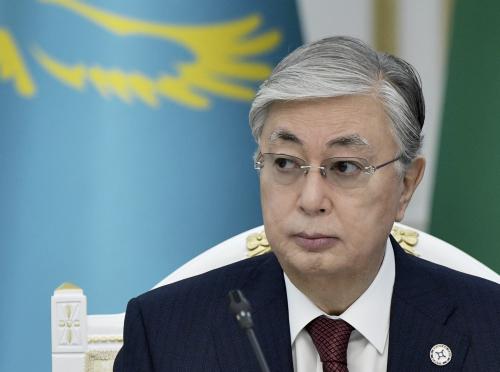government: presidential republic; authoritarian presidential rule, with little power outside the executive branch
state of civil and political rights: Not free
constitution: first post-independence constitution adopted 28 January 1993; new constitution adopted by national referendum 30 August 1995
legal system: based on Islamic law and Roman law;
legislative system: bicameral Parliament consists of the Senate and the Majilis
judicial system: Supreme Court; Constitutional Council
religion: Muslim 47%, Russian Orthodox 44%, Protestant 2%, other 7%
death row: 27 (as of 30/09/2004)
year of last executions: 0-11-2003
death sentences: 0
executions: 0
international treaties on human rights and the death penalty:International Covenant on Civil and Political Rights
1st Optional Protocol to the Covenant
Second Optional Protocol to the International Covenant on Civil and Political Rights (aiming to the abolition of the death penalty)
Convention on the Rights of the Child
Convention Against Torture and Other Cruel, Inhuman or Degrading Treatment or Punishment
situation:
On December 17, 2003, President Nursultan Nazarbayev introduced a moratorium on executions that is to stay in place until the question of the eventual abolition of the death penalty can be resolved.
Kazakhstan had already taken a number of steps towards the restriction of the death penalty.
The new Penal Code - that came into force on January 1, 1998 - reduced death-qualifiable offences in peacetime from 18 to 3: premeditated murder, genocide and sabotage. The death penalty was retained also for treason in wartime and for 7 other military crimes.
On December 27, 2002 Nazarbayev signed into law amendments to the penal code prohibiting the death penalty for minors, women and men over 65 and establishing that death row inmates could not be executed before a minimum one-year period had passed since their death sentence.
A further step towards abolition was the introduction of life imprisonment as an alternative to the death penalty as from January 1, 2004. Courts may continue to pass death sentences until the death penalty is completely abolished.
“I think that we should rise to this level of humanity,” Nazabayev said with reference to abolition in a televised interview on May 14, 2004.
At least 19 people had been put to death in 2003 before the introduction of the moratorium. According to interior ministry data, 32 people were executed in 2001 and 33 in 2002.
In May 2007, Kazakhstan amended its Constitution abolishing the death penalty for all crimes except terrorist acts that cause loss of human life and exceptionally grave crimes committed during wartime.
United Nations
On 30 October 2014, Kazakhstan was reviewed under the Universal Periodic Review by the UN Human Rights Council. Regarding the death penalty, the country’s delegation said Kazakhstan had been firmly moving towards gradual abolition. Despite the fact that it has not yet ratified the Second Optional Protocol to the International Covenant on Civil and Political Rights, the Government has followed international standards by declaring a moratorium on the death penalty, and by utilizing alternatives to life imprisonment. The recommendations to maintain the legal moratorium on executions and to proceed with the abolition of the death penalty enjoined the support of Kazakhstan which considers that they are in the process of implementation.
On December 16, 2020, Kazakhstan again voted in favour of the Resolution on a Moratorium on the Use of the Death Penalty at the UN General Assembly.








